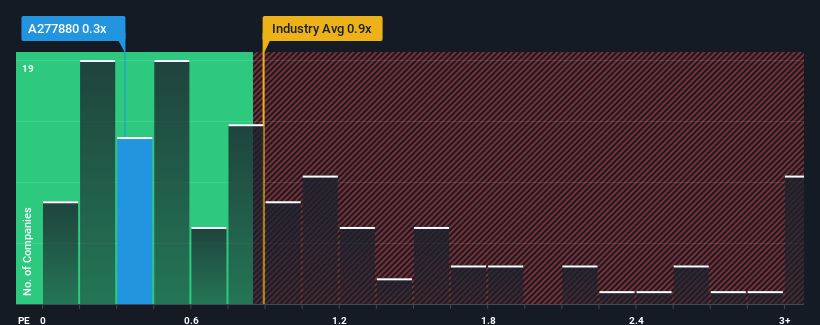- South Korea
- /
- Machinery
- /
- KOSDAQ:A277880
TSI Co., Ltd. (KOSDAQ:277880) Looks Inexpensive After Falling 25% But Perhaps Not Attractive Enough

Unfortunately for some shareholders, the TSI Co., Ltd. (KOSDAQ:277880) share price has dived 25% in the last thirty days, prolonging recent pain. For any long-term shareholders, the last month ends a year to forget by locking in a 51% share price decline.
Since its price has dipped substantially, when close to half the companies operating in Korea's Machinery industry have price-to-sales ratios (or "P/S") above 0.9x, you may consider TSI as an enticing stock to check out with its 0.3x P/S ratio. Nonetheless, we'd need to dig a little deeper to determine if there is a rational basis for the reduced P/S.
See our latest analysis for TSI

What Does TSI's Recent Performance Look Like?
Recent times have been advantageous for TSI as its revenues have been rising faster than most other companies. It might be that many expect the strong revenue performance to degrade substantially, which has repressed the share price, and thus the P/S ratio. If not, then existing shareholders have reason to be quite optimistic about the future direction of the share price.
Keen to find out how analysts think TSI's future stacks up against the industry? In that case, our free report is a great place to start.What Are Revenue Growth Metrics Telling Us About The Low P/S?
The only time you'd be truly comfortable seeing a P/S as low as TSI's is when the company's growth is on track to lag the industry.
Retrospectively, the last year delivered an exceptional 30% gain to the company's top line. This great performance means it was also able to deliver immense revenue growth over the last three years. Accordingly, shareholders would have been over the moon with those medium-term rates of revenue growth.
Shifting to the future, estimates from the sole analyst covering the company suggest revenue growth is heading into negative territory, declining 100% over the next year. That's not great when the rest of the industry is expected to grow by 40%.
In light of this, it's understandable that TSI's P/S would sit below the majority of other companies. However, shrinking revenues are unlikely to lead to a stable P/S over the longer term. There's potential for the P/S to fall to even lower levels if the company doesn't improve its top-line growth.
What Does TSI's P/S Mean For Investors?
The southerly movements of TSI's shares means its P/S is now sitting at a pretty low level. Generally, our preference is to limit the use of the price-to-sales ratio to establishing what the market thinks about the overall health of a company.
As we suspected, our examination of TSI's analyst forecasts revealed that its outlook for shrinking revenue is contributing to its low P/S. As other companies in the industry are forecasting revenue growth, TSI's poor outlook justifies its low P/S ratio. Unless these conditions improve, they will continue to form a barrier for the share price around these levels.
Before you take the next step, you should know about the 4 warning signs for TSI (3 shouldn't be ignored!) that we have uncovered.
If companies with solid past earnings growth is up your alley, you may wish to see this free collection of other companies with strong earnings growth and low P/E ratios.
If you're looking to trade TSI, open an account with the lowest-cost platform trusted by professionals, Interactive Brokers.
With clients in over 200 countries and territories, and access to 160 markets, IBKR lets you trade stocks, options, futures, forex, bonds and funds from a single integrated account.
Enjoy no hidden fees, no account minimums, and FX conversion rates as low as 0.03%, far better than what most brokers offer.
Sponsored ContentValuation is complex, but we're here to simplify it.
Discover if TSI might be undervalued or overvalued with our detailed analysis, featuring fair value estimates, potential risks, dividends, insider trades, and its financial condition.
Access Free AnalysisHave feedback on this article? Concerned about the content? Get in touch with us directly. Alternatively, email editorial-team (at) simplywallst.com.
This article by Simply Wall St is general in nature. We provide commentary based on historical data and analyst forecasts only using an unbiased methodology and our articles are not intended to be financial advice. It does not constitute a recommendation to buy or sell any stock, and does not take account of your objectives, or your financial situation. We aim to bring you long-term focused analysis driven by fundamental data. Note that our analysis may not factor in the latest price-sensitive company announcements or qualitative material. Simply Wall St has no position in any stocks mentioned.
About KOSDAQ:A277880
TSI
A mixing system company, engages in the manufacture and sale of rechargeable battery mixing systems in South Korea, China, Poland, Sweden, France, Vietnam, Malaysia, the United States, Hungary, and Indonesia.
Slight with acceptable track record.
Market Insights
Community Narratives



